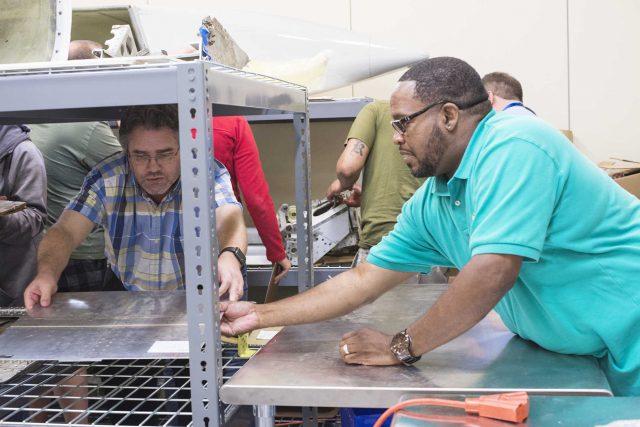By Anne Francomano/tr news editor
Online orders seem to magically appear on doorsteps. Warehouses ship products daily to local brick-and-mortar stores. Manufacturers churn out goods destined for overseas.
These are just some of the links in what is known as a business supply chain.
NW Campus offers an Associate of Applied Science degree in logistics and supply chain management. Certificates in transportation management and warehouse management are also available, each counting toward part of the main degree. Classes are held at the Erma C. Johnson Hadley Northwest Center of Excellence for Aviation, Transportation and Logistics adjacent to Fort Worth’s Alliance Airport.
A supply chain encompasses everything that goes into producing, distributing and selling a product, from suppliers and physical raw materials to customer service, retailers and data. The logistics aspect of a supply chain typically addresses the flow of goods, such as distribution center storage and transportation. Companies desire an efficient supply chain to keep business costs down.
While some students are starting new careers, others enroll to meet new requirements for their existing jobs due to a variety of factors such as job restructuring or a company merger. The program is designed to close the skills gap for local employers.
“Seventy-five percent of current students work and are looking to enhance their skills,” logistics and supply chain management coordinator Mike Esquivel said.
The distribution center work environment is unique. Roles run the gamut from loading trucks and working with shippers on delivery scheduling to purchasing, planning logistics and setting up order-management software. More experienced associate degree graduates can obtain operations management positions.
“Every day is different,” Esquivel said. “There are new products coming in or unique challenges. There are opportunities to work in different areas of business all in one location and do real-world problem solving.”
The program’s 16-week, 144-hour paid internship gives students the opportunity to apply what they are learning. Internship companies include Amazon, DHL, GE Aviation and UPS as well as local nonprofit organizations.
NW student Abigail Ransaw is glad she can use her part-time UPS job in the truck unloading area for the internship credit. When Ransaw looked into internships, she noticed that many required a bachelor’s degree. She noted that the relationships TCC establishes with local firms make a difference.
“Mike Esquivel does a lot of relationship building to build the student interns’ credibility,” she said.
Students also have the flexibility to create their own project either inside or outside of the internship company.
”Students can work on a project for their current employer, or TCC will assist students in finding a position with a company,” Esquivel said. “The internship will demonstrate what they learn in the program and is the capstone to the degree.”
Coursework includes a Business Applications course, a choice of College Algebra or Mathematics for Business and Social Sciences, Microeconomics, Purchasing and Import and Export Principles.
“The primary focus is transportation and warehouse, but it really gives you a taste of everything, all the basic pieces,” Ransaw said.
The program complements Ransaw’s Army experience where she was cross-trained in logistics to handle the commander’s property book, which she enjoyed doing. The property ranged from air defense artillery, trucks and weapons to tents, toolboxes and electrical components.
Now in the Army reserves, Ransaw will finish the program this summer and plans to enroll in UNT, which accepts TCC’s credits.
“You can decide what part of the chain you want to be in,” she said. “At the college level, there are also many supply chain branches, such as the medical field.”
Ransaw looks forward to learning more about warehouse operations and the technology being used to support it.
“It’s not just on one track,” she said. “The opportunities are very broad. You get to affect processes at different levels.”
The program emphasizes valuable qualities for advancement, including working effectively on teams, leadership skills, good communication skills and proficiency in Excel and PowerPoint as well as the ability to learn new software with ease.
Supply chain-related employment is far from localized. If graduates are open to relocation, larger companies offer global opportunities.
“There is unlimited potential for growth,” Esquivel said. “Every industry has supply chain functions and positions.”



































